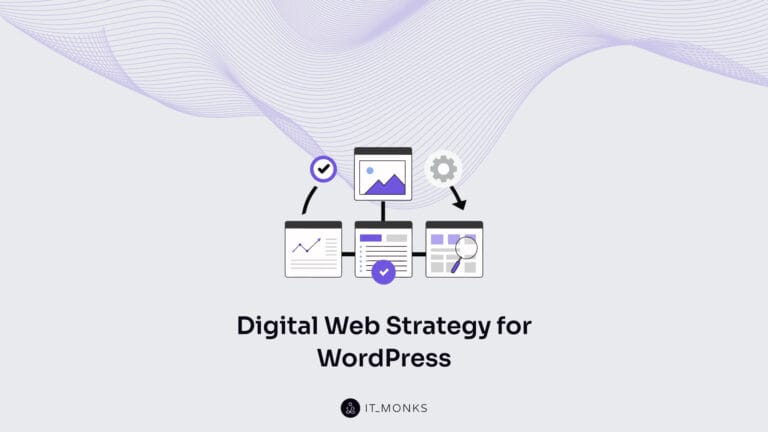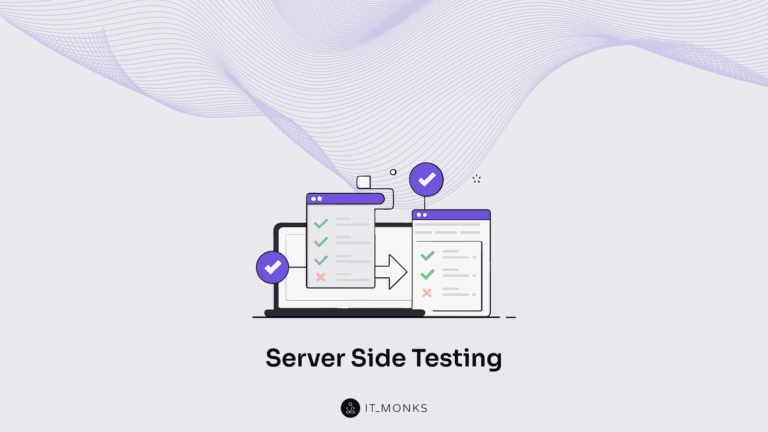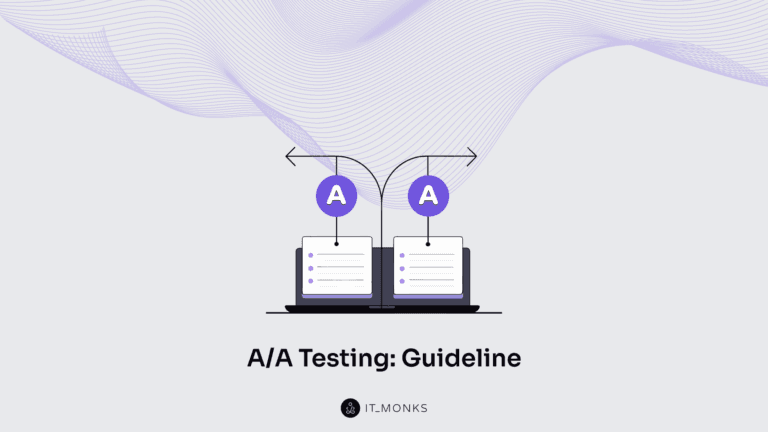What is Enterprise Website Development? (Benefits, Solutions, Price)
Table of Contents
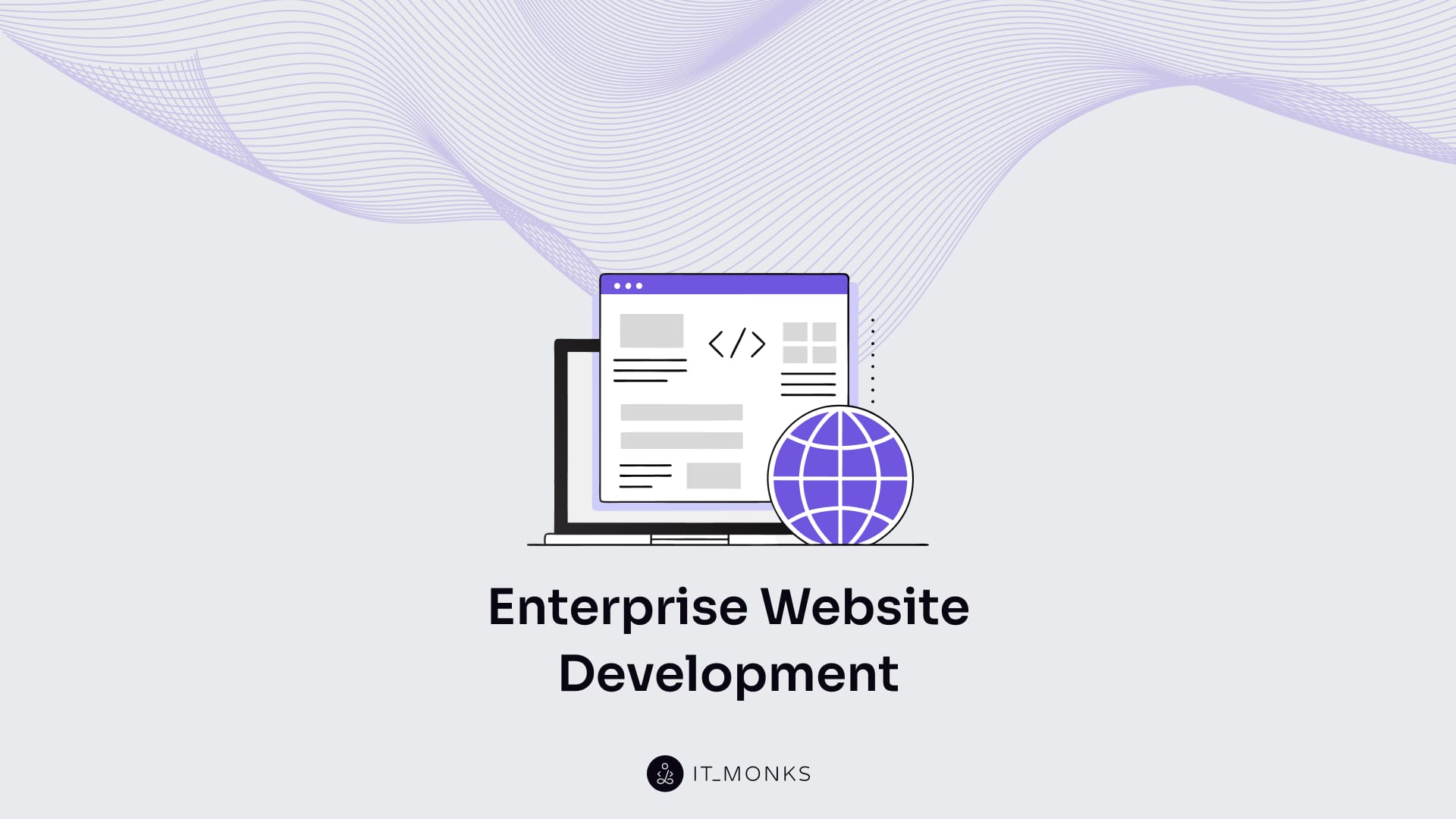
Enterprise website development is the process of designing, deploying, and maintaining complex digital platforms tailored to the scale and complexity of large organizations.
Enterprise websites are designed for high availability, global scalability, and optimal performance. These platforms enable secure access across departments, meet compliance regulations, and support the distribution of content, all within a unified architecture. Unlike personal or small business websites, enterprise development integrates deeply with internal IT ecosystems, including proprietary applications, third-party platforms, and legacy systems.
Built to accommodate enterprise-scale traffic and organizational growth, these websites offer robust user access controls, IT governance protocols, and consistent content workflows.
At the technical level, enterprise website development incorporates content delivery networks (CDNs), load-balancing systems, and advanced caching strategies to ensure reliability under high traffic loads. Modular architecture and diverse technology stacks enable flexibility while preserving performance, security, and compliance standards.
Beyond infrastructure, enterprise websites govern digital operations through editorial workflows, content staging environments, and granular permission systems. These capabilities are extended through APIs, middleware layers, and secure endpoints, ensuring seamless integration with CRMs, ERPs, and cloud environments.
What is an Enterprise Website?
An enterprise website is a digital platform designed to support the content operations, business logic, and governance structures of large-scale organizations. It functions as a centralized hub within an enterprise’s digital ecosystem, enabling real-time data processing, high-volume user access, and secure integrations across platforms and departments.
Unlike personal or small business websites, enterprise websites operate at a greater level of complexity and organizational scale. They support multi-site architecture, layered content hierarchies, and global user segmentation. These platforms are purpose-built for regulated environments, where strict compliance, guaranteed uptime, and deployment oversight are non-negotiable.
Enterprise websites integrate seamlessly with internal systems (such as ERP, CRM, and HRMS platforms) to ensure operational continuity and data cohesion. Role-based access control enables secure digital engagement across departments, regions, and user types.
Beyond infrastructure, the enterprise website governs content operations across distributed teams. It streamlines workflow automation and scales content delivery through centralized editorial governance.
Architecture of Enterprise Website
Enterprise website architecture is a modular, multi-layered framework that powers the scalability, availability, and resilience of enterprise-scale digital platforms. It orchestrates infrastructure, data, and application layers to deliver high-performance experiences across global user environments.
- At the infrastructure layer, the architecture supports elastic scaling, load balancing, and multi-region availability zones. Server clusters are managed via reverse proxies and content delivery networks (CDNs), ensuring fault tolerance and high availability under fluctuating demand.
- The data layer enables secure, real-time access to structured content through a combination of replication strategies, intelligent caching, and access control mechanisms. Designed for both transactional speed and content persistence, this layer ensures low latency and system-wide consistency.
- At the application layer, enterprise architecture leverages microservices, middleware, and APIs to distribute business logic across decoupled services. This enables seamless integration with ERP, CRM, and analytics systems, while allowing for modular deployments and frictionless scaling.
For a deeper technical breakdown, check the enterprise website architecture guide.
Enterprise Website Hosting
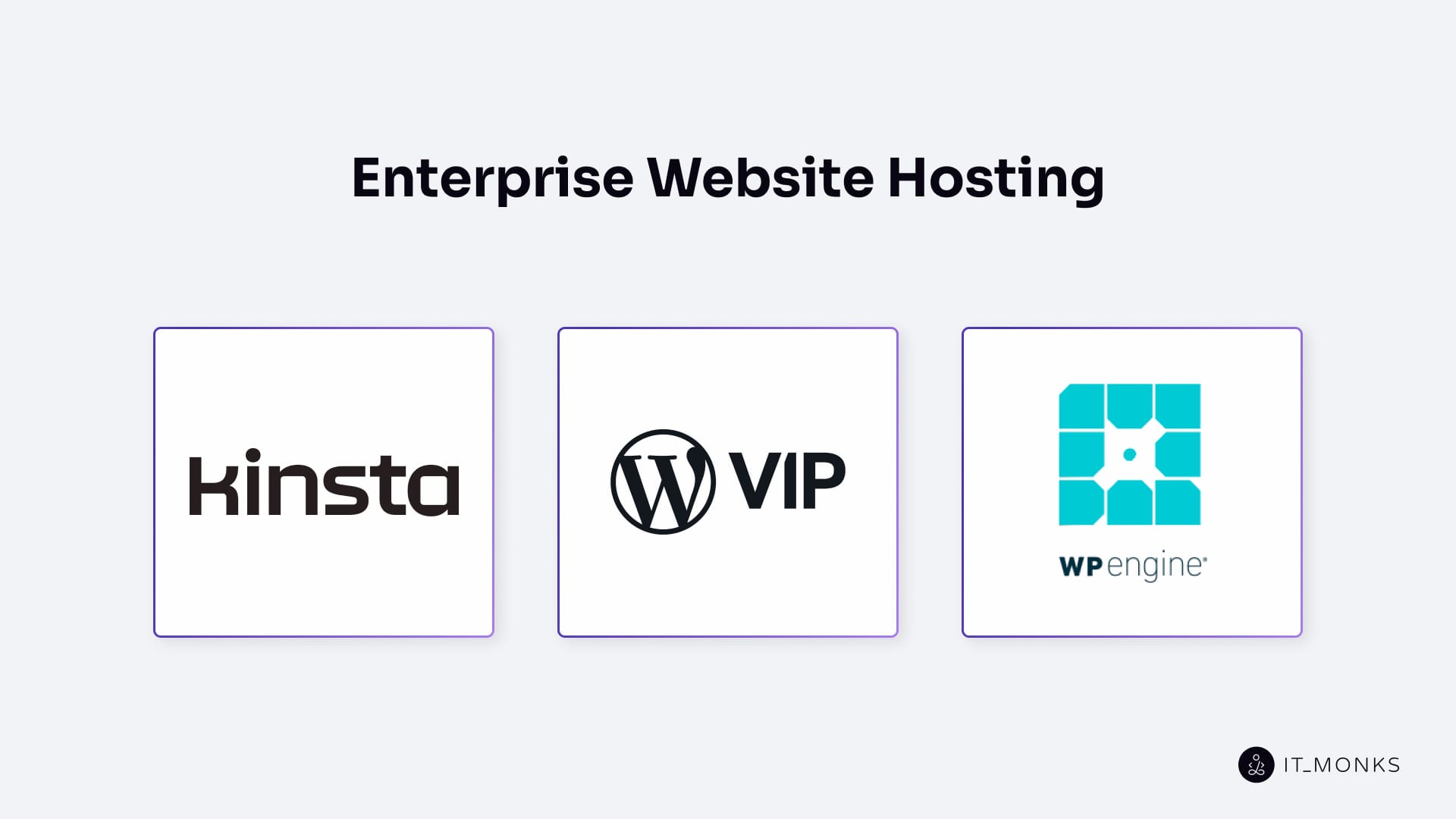
Enterprise website hosting is a high-availability infrastructure layer engineered to meet the performance, governance, and compliance requirements of large-scale digital platforms. Unlike traditional hosting environments, it provides elastic scalability, geographic redundancy, and SLA-enforced uptime, forming the operational foundation for large-scale sites.
At the infrastructure level, enterprise hosting routes traffic across geo-distributed nodes using reverse proxies, DNS failover protocols, and global content delivery networks (CDNs). These systems minimize latency and ensure uninterrupted access across regions and user types.
Dedicated hosting environments isolate tenant applications, supporting granular access controls, infrastructure segmentation, and regulatory alignment with compliance frameworks such as SOC 2 and ISO 27001.
Cloud-native and container-based deployments allow websites to scale both horizontally and vertically through autoscaling thresholds and traffic-aware orchestration. Infrastructure-as-code (IaC) tools manage CI/CD pipelines, enable environment provisioning, and support rollback procedures for disaster recovery scenarios.
Managed enterprise hosting platforms deliver real-time performance telemetry, multi-level access governance, and automated alerting, reinforcing DevOps and OpsSec workflows at scale. SLA benchmarks typically exceed 99.9% uptime, backed by contractually enforced monitoring metrics.
For a deeper breakdown, explore enterprise web hosting strategies and models, including specialized platforms such as WPVIP, Kinsta, and WP Engine.
- WPVIP is a containerized WordPress hosting platform built for high-scale, compliance-driven environments. It supports multi-region failover, global CDN routing, and performance acceleration layers. Integrated Git workflows, CI/CD pipelines, and IaC tooling enable rapid publishing aligned with newsroom operations. The platform ensures compliance with SOC 2, GDPR, and FedRAMP through access segmentation, audit trails, and version-controlled deployments with automated rollback capabilities.
- Kinsta delivers containerized WordPress hosting on the Google Cloud Platform, utilizing isolated LXD containers to provide dedicated compute resources, security boundaries, and auto-scaling based on traffic demand. Its stack integrates Nginx, PHP workers, object caching, and a global CDN for low-latency performance. Developers benefit from SSH access, Git-based workflows, real-time database tools, and staging environments, all of which are managed through the MyKinsta dashboard with built-in APM monitoring.
- WP Engine is a managed enterprise WordPress hosting platform spanning Google Cloud and AWS, optimized for resilience, multi-environment workflows, and rapid deployment cycles. It leverages container orchestration, EverCache, and edge-based CDN routing for high-availability delivery. DevOps teams utilize Git-triggered CI/CD pipelines, access governance, plugin restrictions, and version-controlled updates, with compliance frameworks such as SOC 2, ISO 27001, and GDPR fully supported.
Enterprise Content Management Systems
An Enterprise Content Management System (ECMS) is the architectural backbone that manages the lifecycle, structure, and distribution of digital content across complex organizational ecosystems. ECMS governs enterprise-scale editorial workflows, access permissions, and cross-channel content delivery with precision and regulatory control.
The system structures content using reusable templates, version-controlled assets, and structured metadata, enabling multilingual content variants, audit-compliant revision histories, and role-based editorial governance. Automated workflows handle approval chains, publication scheduling, and rollback protocols across departments and geographic locations.
At the infrastructure level, the ECMS integrates with various enterprise platforms, including ERP, CRM, DAM, PIM, and DXP systems. This integration ensures consistent data flow, content coherence, and system-wide compliance, supporting both marketing operations and IT governance.
Different ECMS platforms approach scale, governance, and experience delivery from varied architectural standpoints:
- WordPress offers a modular, API-first CMS optimized for scale, governance, and developer autonomy. It supports headless architectures, REST endpoints, and multisite deployments, with editorial control enforced via roles, revision logs, and custom post types. Git-enabled CI/CD, plugin governance systems, and CDN acceleration underpin performance, while multilingual publishing and structured metadata support global delivery workflows.
- Oracle WebCenter Content is a compliance-focused ECMS engineered for document lifecycle management and risk governance. Metadata taxonomies, legal hold workflows, and ERP/SSO integration support secure document traceability. Its regulatory modules enforce HIPAA, SOX, and GDPR policies, prioritizing defensibility and centralized control across highly regulated sectors.
- Adobe Experience Manager (AEM) delivers experience-led content orchestration through modular assets, SPA editing, and GraphQL APIs. Integrated with Adobe’s martech stack, AEM enables real-time segmentation, localization workflows, and campaign testing across web, app, and mobile surfaces. It balances personalization and omnichannel reach with structured governance for large-scale digital engagement.
For a detailed breakdown, explore enterprise CMS functions and capabilities.
Technology Stack for Enterprise Sites
The technology stack for enterprise websites is a multi-layered system architecture that delivers the infrastructure, logic, integration, and observability required for secure, scalable digital operations. It forms the operational backbone of modern enterprise web ecosystems.
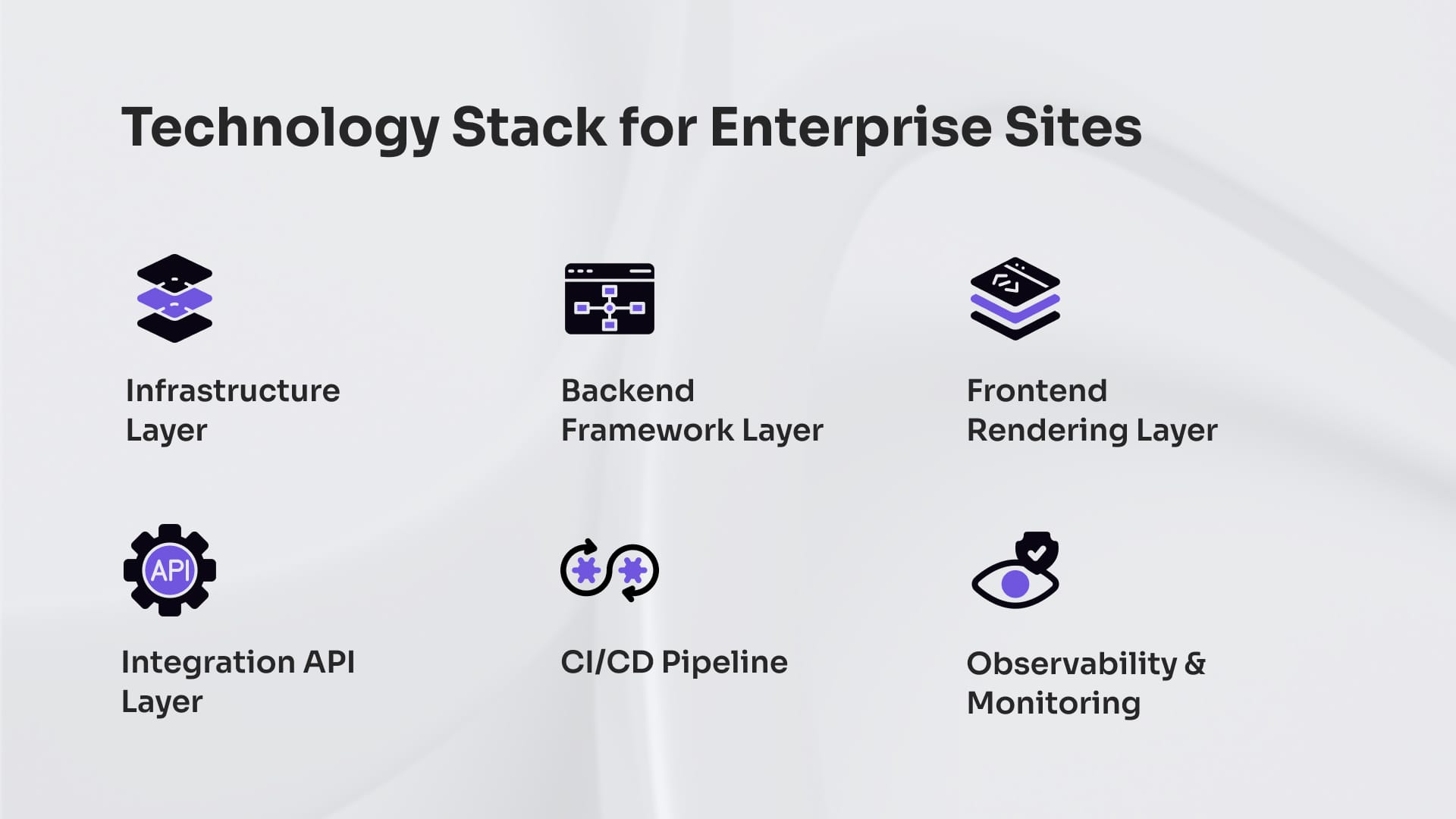
- Infrastructure Layer: This layer provisions cloud-native environments using container orchestration platforms, such as Kubernetes, which run across major cloud providers like AWS, Azure, or Google Cloud Platform (GCP). It ensures platform-level elasticity, resource isolation, and system-level scaling.
- Backend Framework Layer: Application logic and service orchestration are managed through backend frameworks like Node.js, .NET Core, Java, or Python. These systems handle authentication, data flow, and content transformation, enabling secure and resilient application behavior.
- Frontend Rendering Layer: User-facing experiences are delivered through frontend frameworks such as React, Angular, and Vue. These leverage server-side rendering (SSR) or client-side hydration to provide personalized, performance-optimized output across devices and regions.
- Integration API Layer: Connectivity with enterprise platforms (such as CRMs, ERPs, and ECMSs) is orchestrated via REST, GraphQL, or middleware services. This layer standardizes the exchange of enterprise data across internal and third-party systems.
- CI/CD Pipeline: Version control, automated testing, deployment, and rollback are governed through DevOps pipelines using GitHub Actions, Jenkins, or GitLab CI. This layer enables continuous delivery with operational safety and traceability.
- Observability and Monitoring: Platforms like Datadog, Prometheus, and New Relic provide real-time observability into service uptime, latency, and system health. These tools support incident response, performance tuning, and SLA compliance monitoring.
Enterprise Website Design Principles
Enterprise website design principles define system-governed rules that standardize layout behavior, component reuse, accessibility compliance, and performance logic across multi-brand and multi-device surfaces. Enterprise design is executed via the following governed systems.
The Component Library provisions CMS-integrated modules bound by semantic HTML, ARIA roles, and reusable design tokens, enforcing consistency and accessibility across templates.
The Responsive Layout Model optimizes mobile-first rendering via adaptive breakpoints and performance-aware content flow.
The Accessibility Compliance Layer enforces WCAG 2.1 standards through structured HTML5, keyboard navigation logic, and enforcement of accessibility audits.
The Localization-Ready Interface adapts UI logic for multilingual delivery, mirrored layouts, and right-to-left support.
The Design Governance Framework governs version control, pattern libraries, and cross-team approval workflows, ensuring alignment between execution and brand and content strategy.
The Semantic Content Structure embeds meaning into the layout through component constraints, metadata tagging, and a structural hierarchy, ensuring that design serves function.
Design Examples of Enterprise Websites
Design examples of enterprise websites illustrate how system-governed design principles are implemented through scalable architecture, accessibility layers, localization logic, and brand governance frameworks.
Some of the most well-known examples of enterprise website designs include the following:
- The Salesforce website utilizes the Lightning Design System, which structures component hierarchies through responsive grid frameworks and reusable UI tokens. Its an ARIA-based accessibility model that supports screen readers, while mirrored layouts and dynamic text containers address global content needs. CMS-DXP alignment is reflected in its integration with Salesforce’s own Experience Cloud.
- The Apple Enterprise Web Interface adheres to Human Interface Guidelines, standardizing layout behavior via fluid breakpoints, modular content blocks, and semantic HTML. Accessibility compliance is enforced through high-contrast modes, semantic headings, and keyboard navigability. Apple’s localization layer provisions mirrored interfaces, native-language rendering, and content fallback logic across regions, reinforcing systemic brand control.
- The Microsoft Online Ecosystem applies Fluent UI to structure reusable component libraries across SharePoint and Azure-integrated web properties. Design governance ensures visual consistency and interaction logic, while maintaining WCAG 2.1 compliance through the use of alt tags, focus management, and ARIA roles. Localization systems accommodate RTL layouts and multilingual toggling for global scalability.
Enterprise Software Integrations
Enterprise software integrations define the website’s role as a governed middleware layer that connects backend enterprise systems to frontend user experiences through secure, schema-aligned interfaces.
The Enterprise Website Integration Layer provides API-based connections to CRMs, such as Salesforce, and ERPs, like SAP, transforming internal data into structured UI outputs. Each Attribute Mapping Schema renders product, customer, or workflow data from platforms like Oracle NetSuite or HubSpot into normalized frontend displays.
DAM asset pipelines expose media via CDN-linked endpoints, while marketing connectors automate user handoff into platforms like Marketo. Integration pipelines manage both real-time webhooks and batch synchronization operations, orchestrated through rate-limited API gateways and error-handling middleware.
Within this framework, the Data Normalization Layer governs entity matching, PII masking, and cross-system data consistency.
Explore our guide on enterprise integrations and discover how middleware layers form the operational backbone of enterprise websites.
Enterprise Website Security
Enterprise website security is a multi-layered architectural framework that protects infrastructure, applications, users, and data surfaces through the governed enforcement of protocols, authentication, encryption, and monitoring.
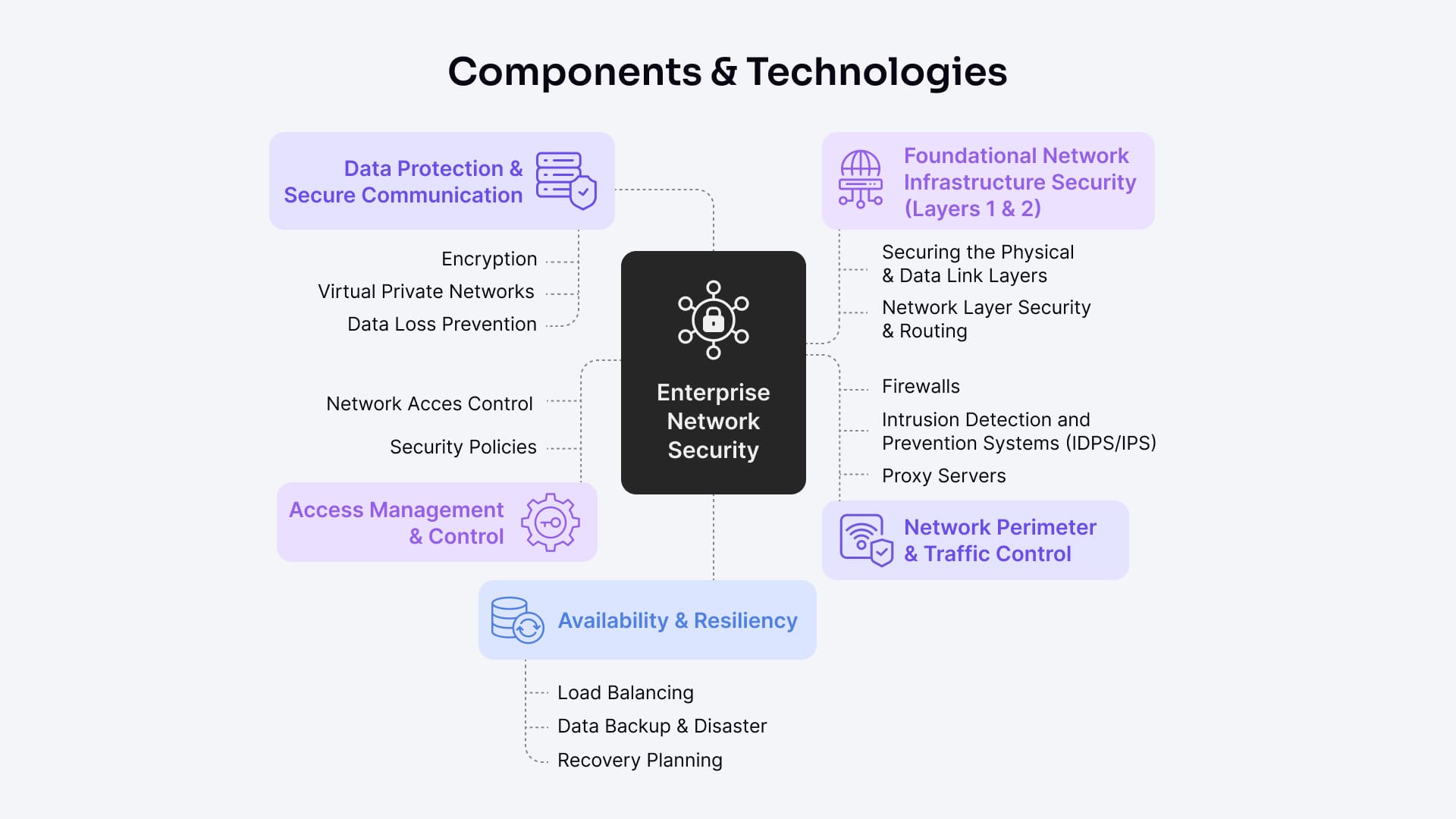
- The Transport Layer Security Enforcement governs data transmission using TLS (typically TLS 1.3), HTTP Strict Transport Security (HSTS), and secure cipher suites, ensuring traffic integrity and confidentiality.
- The Application Layer Protection defends against injection attacks, XSS/CSRF, and session hijacking through input validation, rate limiting, Web Application Firewalls (WAFs), and security headers such as Content Security Policy and X-Frame-Options.
- The Identity and Access Management (IAM) system offers Single Sign-On (SSO), Role-Based Access Control (RBAC), OAuth 2.0/OpenID Connect, and multi-factor authentication (MFA) to manage user permissions and authentication effectively.
- The Data Encryption Policy safeguards data both at rest and in transit, implements field-level masking for Personally Identifiable Information (PII), and ensures adherence to best practices for cryptographic key management.
- The DevSecOps Integration Pipeline embeds static analysis, dynamic testing, and policy enforcement gates within CI/CD workflows to ensure secure code deployment.
- The Intrusion Detection Layer monitors for traffic anomalies, bot behavior, and IP reputation signals, combining real-time logging and alerting mechanisms to detect and escalate threats.
- The Compliance Enforcement Module ensures alignment with frameworks such as SOC 2, ISO 27001, and GDPR, which govern data handling, access controls, and protocols for mitigating breaches.
Learn more about enterprise network security frameworks at enterprise network security.
Enterprise Website Marketing
Enterprise website marketing is a system-level architecture that expands customer reach and market share by orchestrating the delivery of structured content, behavioral tracking, and full-funnel automation across CRM, CDP, and MAP systems. Enterprise marketing provisions governed data flows across marketing layers, making the website a core activation surface rather than a standalone channel.
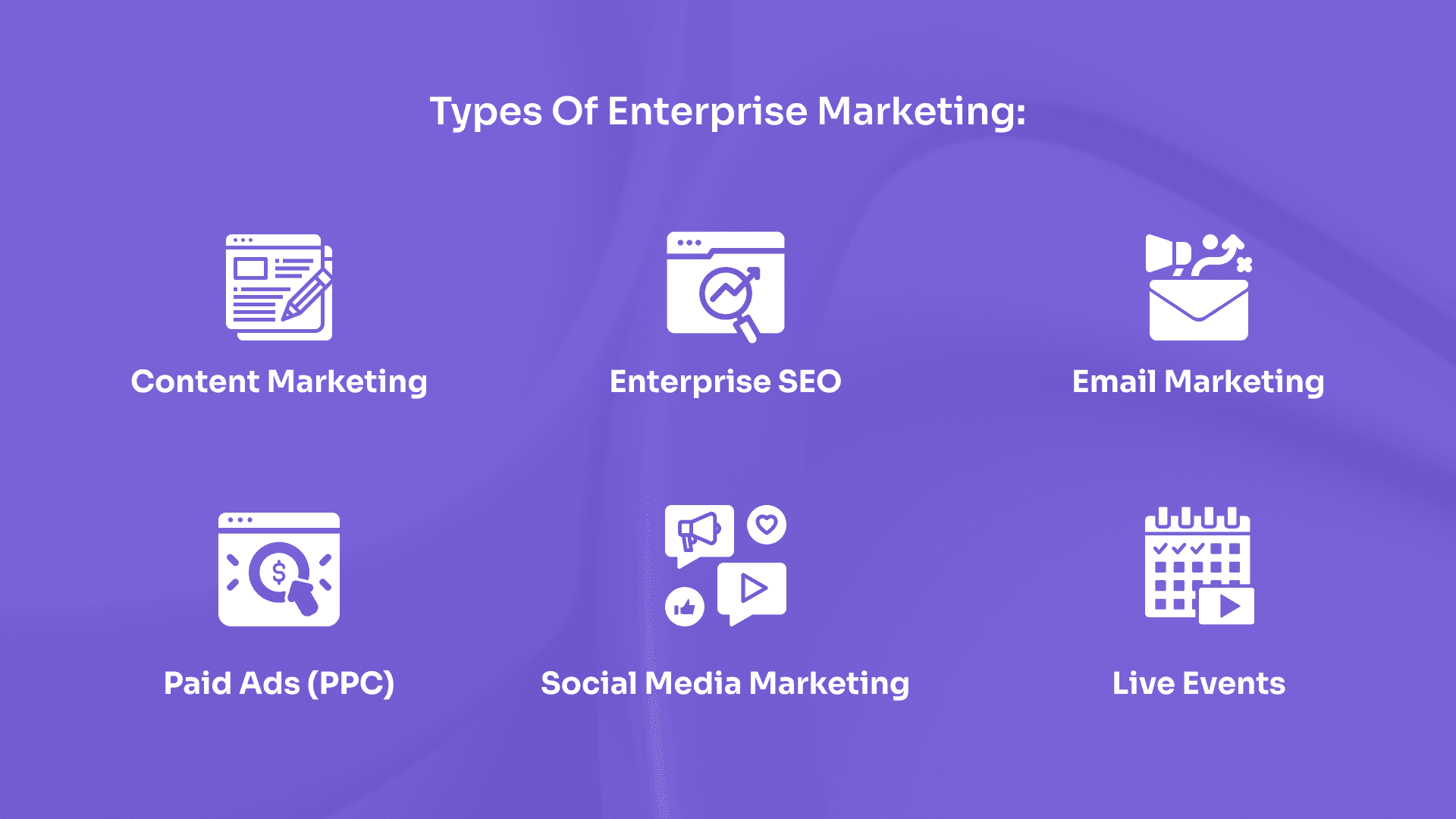
Content Infrastructure delivers metadata-tagged pillar pages and topic clusters, aligned with schema.org logic for structured scoring and campaign alignment.
Attribution Mapping System tracks UTM-tagged traffic, synchronizes visitor paths with CRM records, and maps multi-touch journeys from landing to conversion.
The Marketing Automation Engine routes gated interactions, such as form submissions and asset downloads, into CRM workflows that score leads and trigger cross-channel follow-ups.
Personalization Module activates visitor-specific content using segmentation rules from the CDP layer, adapting content delivery to behavioral and firmographic triggers.
CRM Data Sync Pipeline pushes engagement signals upstream to lead and opportunity objects, governed by structured scoring models and campaign taxonomy.SEO Content Structure enforces schema exposure, canonical mapping, and semantic hierarchy to support structured visibility. This governs SEO for enterprise through indexable entity logic and metadata validation.
Enterprise Website Analytics
Enterprise website analytics is a behavioral data architecture that captures and normalizes user interactions as structured event payloads. Each analytic layer functions as a governed system, exposing structured user journeys, performance signals, and engagement thresholds as operational data flows. These layers include tracking logic, event mapping, identity stitching, data pipelines, and compliance enforcement.
- The Enterprise Analytics Layer provisions hybrid tracking models, blending client-side scripts and server-side APIs, to synchronize behavioral flow across platforms.
- The User Event Taxonomy maps page actions (scrolls, CTA clicks, form submits) into schema-governed EAV structures, versioned for consistency in data layer deployment. Identity Resolution Engines stitch session data via client IDs and fingerprinting to unify anonymous, authenticated, and CRM-linked journeys.
- The Behavioral Data Pipeline routes normalized events into CDPs (e.g., Segment), CRMs (e.g., Salesforce), and BI platforms (e.g., BigQuery), enabling real-time activation and campaign attribution. Attribution Mapping Modules resolve multi-touch paths across channels and sessions, governed by attribution windows and funnel logic.
- Regulatory Compliance Layers restrict capture by region and consent state, enforcing GDPR/CCPA via cookie logic and data retention policies. A/B testing systems and personalization engines integrate directly into the pipeline, triggering decision logic from tracked behavior.
Development Team Structure
Enterprise Development Team governs layered platform execution through system-bound roles mapped to architectural domains.
- Enterprise Development Team governs execution through role-bound platform layers and predicate-aligned responsibilities across the development stack.
- Frontend Engineering Role governs semantic HTML scaffolding, ARIA enforcement, and UI component behavior within layout constraints.
- Backend Integration Layer orchestrates ERP/CRM API flows, abstracts logic via versioned endpoints, and stabilizes internal service schemas.
- Infrastructure Orchestration Team provisions containerized environments with Kubernetes, enforces GitOps pipelines, and manages secrets via Vault/SOPS.
- QA and Testing Surface enforces automated coverage, validates integration flows, and runs accessibility audits tied to functional metrics.
- Design System Unit implements token-based style libraries, synchronizes component behavior across Figma/Storybook/code, and governs layout logic.
- Security Governance Role configures IAM policies, injects JWT/token controls, and enforces DevSecOps encryption workflows in CI pipelines.
- Product Management Framework synchronizes Jira/Git-based workflows, governs backlog logic, and validates releases via milestone controls.
- Deployment Pipeline Control Logic validates schema merges, triggers jobs, and manages rollbacks through structured CI workflows.
Project Timeline for Enterprise Web Development
Enterprise Development Timeline gates progression through predicate-bound system states, where execution phases unlock based on infrastructure readiness, schema finalization, and compliance validation.
- Content Modeling Stage unblocks CMS schema exposure, triggering the generation of templates aligned with entity structures and semantic output logic. Architecture Provisioning Phase provisions hosting layers, deployment pipelines, and observability systems, gating all downstream development.
- Design System Finalization triggers the activation of the template layer, enabling layout rendering, component injection, and accessibility scaffolding. API Readiness Window gates frontend logic by validating endpoint contracts, authentication layers, and integration availability through schema version tags.
- Frontend Template Layer synchronizes with content structures and design tokens, rendering UI views aligned with entity exposure logic. QA and Testing Checkpoint validates test coverage thresholds, regression audit completion, and accessibility conformance via Lighthouse, Axe, and Jest coverage logs.
- Security Review Stage provisions include compliance documentation, DevSecOps validations, and IAM policy enforcement, locking critical paths until these requirements are met. Staging Deployment Slot deploys signed-off builds under version freeze conditions, exposing release candidates for final review by stakeholders.
- Release Synchronization Framework coordinates production deployment, rollback preparation, and milestone closure through structured GitOps flows and ticketing workflows.
Enterprise vs Small Business Websites
The enterprise website system provisions a multi-layered architecture, synchronizes delivery via CRM/CDP/ERP integrations, and enforces schema-governed logic across content, design, and deployment. The small business website model reduces delivery to templated builders, flattens schema into static page constructs, and abstracts backend logic through third-party widgets.
The Integration Surface Layer orchestrates API-driven flows across services and identity systems for enterprises, while small business sites expose limited interactions via embedded forms and basic analytics.
The Content Modeling Framework enforces multi-entity taxonomies and structured metadata at the enterprise level, versus WYSIWYG interfaces and manual tagging in small business models.
The Governance Pipeline synchronizes approval workflows, schema validation, and versioned publishing, while small business content updates bypass governance and rely on direct edits.
The Design System Architecture enforces component reuse and tokenized themes for brand consistency; in contrast, small business design relies on template inheritance or ad hoc changes.
The Security Enforcement Layer governs access through IAM policies, DevSecOps controls, and audit trails, whereas small business layers enforce basic TLS and optional 2FA.
The Deployment Infrastructure Logic renders CI/CD workflows, container orchestration, and environment isolation for enterprise; small business models reduce this to drag-and-drop publishing or shared hosting.
Contact
Don't like forms?
Shoot us an email at [email protected]

